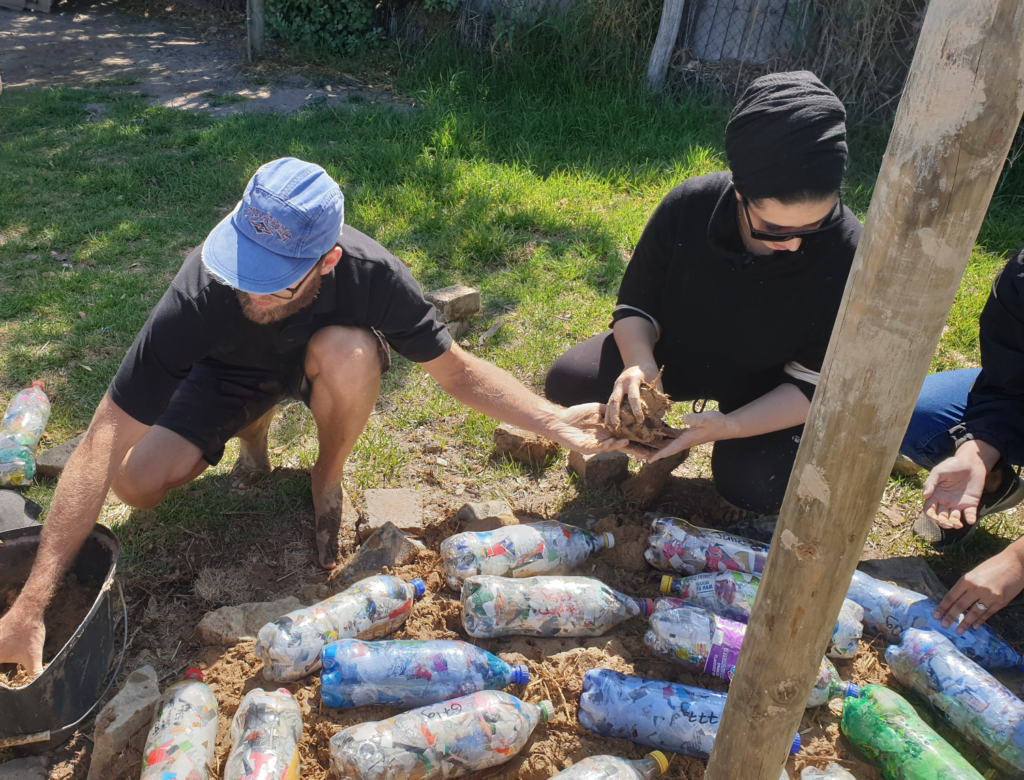On 2 March, Ecolution teamed up with Waste-Ed and Bhongulethu foundation school in Masiphumelele to put our collected ecobricks to good use.
For anyone that doesn’t know, an ecobrick is a plastic bottle of any size that is packed tightly with clean and dry, non-biological/non-biodegradable waste. Once complete, these bottles can be used as building materials for modular furniture or insulation etc for buildings.
We see ecobricks as a great way to contain non-recyclable waste from reaching landfills or the ocean and a way to track and phase out the non-recyclables we are buying! Ecobricks should not be seen as a replacement for refusing and reducing plastic where possible.
Below you can see a screenshot of the percentage of waste we divert from landfill and the percentage of that waste is currently being ecobricked, taken from our live sustainability dashboard.

Two years of non-recyclable waste from our team (including some ecobricks the team brought from home) resulted in 36 Ecobricks, each weighing around 700g each.
The ecobricks were then used on 2 March in the building process of building a bench with and for the Grade 3 class of Bhongulethu using natural building techniques.
The natural building process uses cob (a mix of straw, sand, clay, and water) as a building material which is a fire deterrent and prevents the ecobricks from being crushed and destroyed when encased in the cob. This means if the structure ever has to be destroyed the ecobricks could be reused again.


Whilst we were not able to fully complete the bench on the day, which will be completed by Waste-Ed, we had a lot of fun getting the process started and are happy to have been able to fund the build and take part in it ourselves.
A big thanks to Waste-Ed and Bhongulethu foundation school.
Want to Ecobrick?
STEP 1: Collect
Collect non-recyclable materials like chip packets, dog food bags, small bits of unmarked plastic, plastics marked with the number seven/plastics that are multilayered, as well as bits and bobs that will likely end up in the landfill.
STEP 2: Pack & Compress
You can prepare your plastics by cutting them up if they are quite large. Twist and stuff your ecobrick with the plastic and compress the waste into a bottle (2l bottles work best). Pack tightly to ensure it is strong enough to hold its shape when pressure is applied to it.
STEP 3: Measure
If you think that the bottle is full and tight enough it’s time to measure. Ecobricks can contain a surprising amount of waste so if you think you’re done, you can probably get more into it.
Hint: If you can stand on it without it losing shape, you are good to go!
STEP 4: Drop off
Look out for a drop off site near you. We partner with Waste-Ed in Cape Town.
STEP 5: Get involved in a build
Eco brick builds need funds and helping hands. If you can donate more than your ecobricks, please do, as this will ensure the ecobricks actually get utilised in a manner that can benefit people and the planet.
Contact Waste-Ed for more information on how to get involved.


